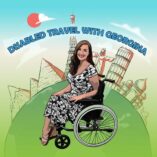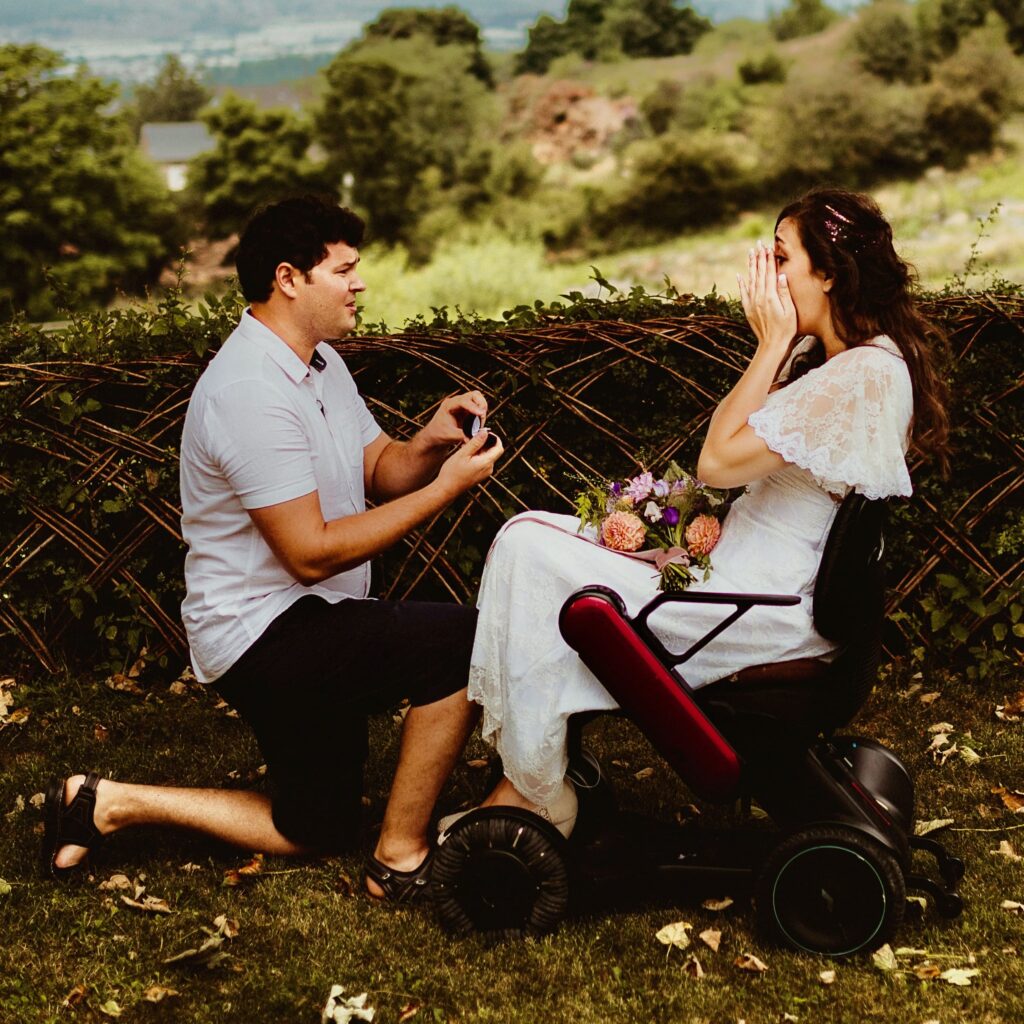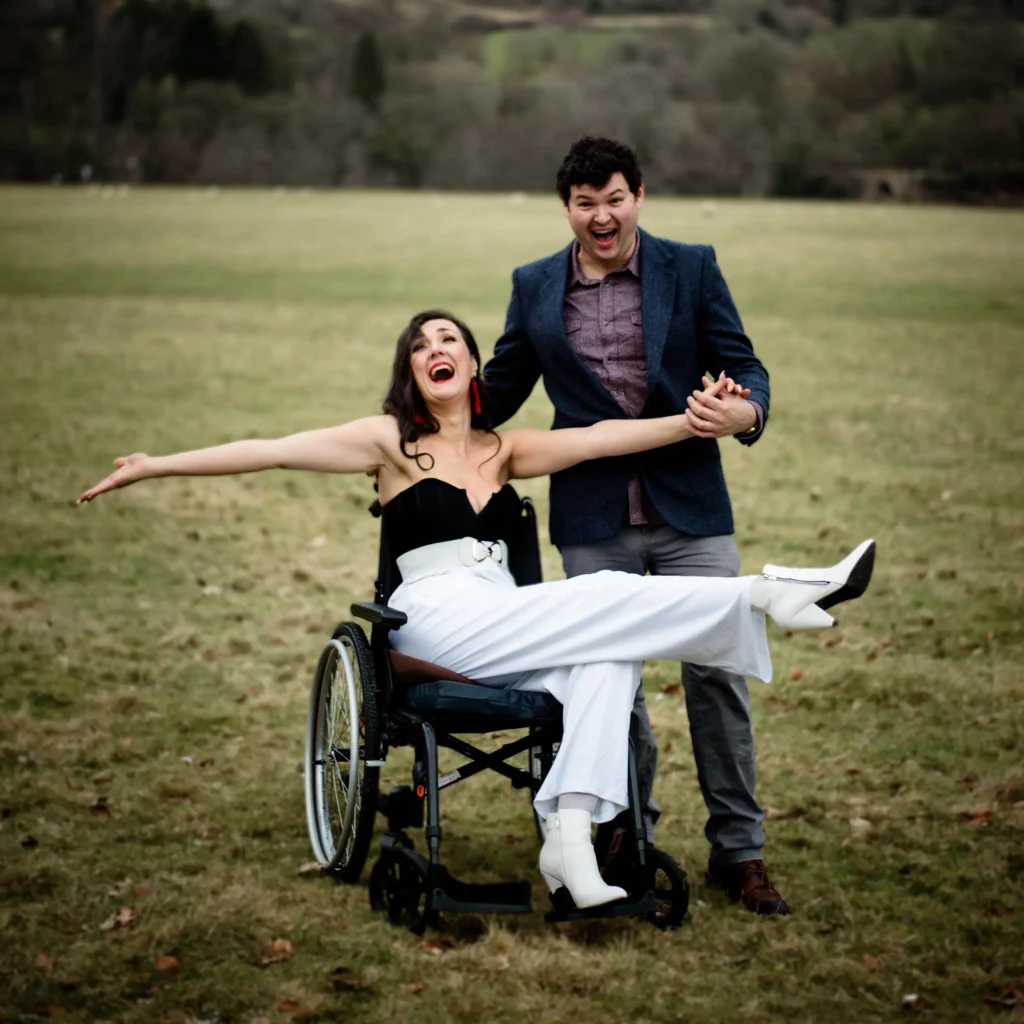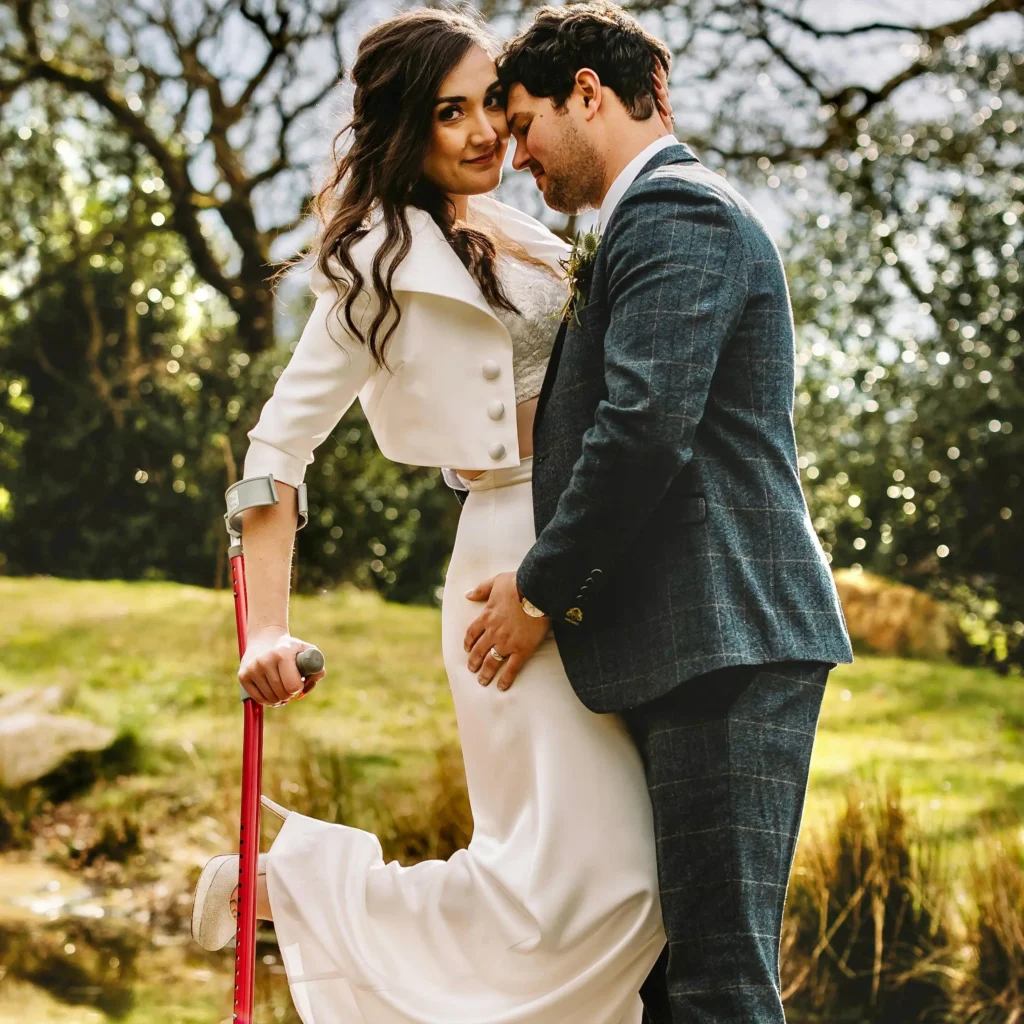Those of you that have followed me for a while may have seen my previous post about the inter-abled formal dance that the wonderful instructor, Helen, at Freewheelin Inclusive Dance has helped my future husband and I to learn. Let’s not lie, we are not the most graceful of pairings and dance floors, spotlights and wedding dress chiffon are going to be a killer combination (and not in a good way!) so I am insanely grateful that Helen has helped us out with an adaptive first wedding dance that allows us to be ourselves but also look somewhat “put together” whilst swooping around the dance floor in my powered wheelchair. I am just praying to every deity in recorded existence that I preserve his toes and don’t crush them in front of every friend, neighbour and family member on our wedding day. I swear, as wedding planning goes on, I am slowly but surely unlocking new lifelong fears haha!
Seriously though, Helen was great at calming our nerves since we were such beginners at formal dancing. I must admit that the height difference between Richard’s 6ft standing frame and my wheelchair seated height added a few complications to the waltz pose but Helen was so reassuring and also made the formal dancing seem fun. We got to know her so quickly – even over the dreaded Zoom video call which we have all come to despise over this year of lockdown! Helen’s chatty disposition was fabulous too as Richard’s never been naturally inclined towards being the centre of attention, especially when doing choreographed physical movements haha! The movements of the first wedding dance were all adapted to my abilities; reducing fatigue, limiting my pain where possible and even lessening the chance of popping my shoulders out from their joints. In day to day life, I do end up passing out from pain quite a bit when I’m pushing it but I don’t really want to have to experience that in front of a specifically gathered crowd on my wedding day, literally under a spotlight and on film. I would never live it down! That’s why Helen’s adaptations were amazingly helpful for us to have a beautiful first dance that I was still capable of performing.
Talking of hitting the floor (this time not quite so literally), today though I wanted to talk a little bit more about the other dancing parts of the wedding day – the moments when you take to the dance floor with your friends or family and have a little boogie. Those moments when the nostalgic cheesy tunes pump out of the DJ’s speaker and you throw your drink back and hustle down to the dance floor. For this session, I pounced at the opportunity to partner with Helen from Freewheelin again as she showed me some more carefree and fun dance moves and routines that would suit any ability or disability. Helen runs dance classes on a Tuesday and a Friday (details can be found here) and I’ve joined a few of those classes – they’re so fun and feel like a good giggle with friends rather than an exercise class! How can a bunch of people who make wonderful dance videos like this be anything but an amazing time?!
During the dance class, I wanted to mimic that “strut your stuff down to the dance floor” moment so I brought along a couple of my friends to join us when dancing along to Helen’s wonderful adaptive routines! Both of these wonderful ladies are my friends but also make great contributions in the world of access and inclusion!
Philippa Bradford is my wedding planner at Remembered Occasions which is an events planning agency specifically tailored to create cherished moments and memories at big events whilst also having access in mind. I LOVE that Philippa has chosen to aid future spouses in their marital journey whilst thinking about their inclusion and that of guests; you have enough to worry about on your wedding day without thinking about whether the toilet will be accessible or the speeches system will have a hearing loop. Access means different things to everyone so I’m thrilled that Philippa has chosen to channel her creativity, spark and problem solving into an undersaturated market of events such as parties and weddings for chronically ill guests and couples!
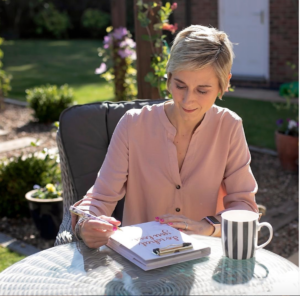
Georgia Vine also joined us for our grand dance-off! Georgia is an Occupational Therapist student at Sheffield Hallam University and also has Cerebral Palsy. I personally think it is this killer combination of being a patient and a medical professional herself that has helped her channel such awareness into her blog Not So Terrible Palsy where she writes about her experiences as a disabled student and gives helpful details about OT practices themselves. More than anything, Georgia shows us how to focus on what we can achieve rather than what is easy but to treat our chronically ill bodies with respect and kindness as we move towards our goals.
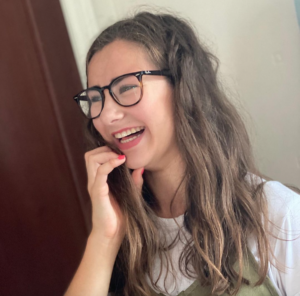
So, what are the problems that disabled party-goers may face in terms of the fun dancing section of the wedding?
Physical/ Space-related Restrictions
Some abled people might not like dancing for a multitude of reasons but for disabled or chronically ill people it is a whole other kettle of fish. First of all, obviously there are a huge amount of physical restrictions that can impact on whether a disabled person can boogie on down (Is the dance floor big enough for a wheelchair and clear of obstructions? Are there free chairs nearby if fatigue or dizziness suddenly hits whilst dancing? Are animals, balloons or small children going to be potentially hurt by mobility aids being moved around to music?) and these are hugely stressful. As a spoonie wedding guest, you have to basically be Rain Man and have superpowered ability to analyse and remember every potential threat in a room before you approach an area. For me personally, driving a heavy powered wheelchair can take a lot of concentration and I find that dancing is insanely hard at an event that I haven’t personally organised as I don’t know what sort of obstruction will be around if I do a spin or just let myself be immersed in the music to dance. Luckily, my friends generally dance around me when we go out (pre-COVID) to clubs rarely so that I have a bit more dancing room and we tend to aim for a space at the very edge of a room so we only have people on one side.
If you are organising a wedding, a disabled guest will LOVE you forever if you have given us a nice big dance floor so we can actually enjoy ourselves without having eyes in the back of our heads and bubblewrap around every single wheel haha! As Helen says at the start of all of her dance classes, make sure you’ve not got any precious vases or pets nearby before you start dancing.
I love having Philippa from Remembered Occasions as my wedding planner as she understands what it is like to need mobility aids through her own disabled experience with MS; she was so understanding when we spoke about my physical needs when touring wedding venues. I just don’t want to have to worry about access at all on my wedding day and I don’t think that any guest should have to worry about feeling included in any wedding day if the reception venue is capable of making adaptations!
Bodily Limits
Beyond the physicality, there are so many concerns or worries that chronically ill brides, grooms or guests might have when they want to go and dance. Their own health is going to be a huge concern since many chronically ill people receive side effects from their conditions; whether it is pain, fatigue, limited mobility or nausea. Of course, we all have the set repertoire of dance moves that we’ve reserved since we had our first sip of wine at a party. My personal favourites are bopping the head randomly to the music and randomly waving my arms around or basically doing a giant karaoke session on the dance floor with my best friends! I think the thing that Freewheelin helped with here was that I learnt a few new “go-to” moves that I felt were fun and adaptive for my health and wheelchair use. Of course, I will still continue to rock the “old familiar” moves and generally waving my upper body around in a very uncoordinated way!
As I explained earlier, Helen ran a private class this time for Philippa, Georgia and I for an hour to showcase some of her routines and awesome dance moves. You can email Helen (freewheelin@yahoo.com) to arrange private classes, whether this is for a group of friends or for a wedding first dance, for £25 an hour. However, the great thing is that Helen actually also runs regular classes on Tuesdays and Fridays
It is really important to listen to your body when dancing and not to push past your own physical capabilities when you dance. As an Occupational Therapist, Georgia Vine speaks about being honest to others and yourself about your own needs a lot on her blog Not so Terrible Palsy where she combines details of her experiences as a young adult with Cerebral Palsy and as a student of OT. I would highly recommend reading her blog posts; not only is she a great friend of mine but she also articulately talks about a range of experiences that chronically ill people go through and ways to help
Societal stereotypes
There is a huge perception in society and the media that disabled people can’t dance, particularly disabled people who are in a wheelchair like myself. This is predominantly due to the fact that in movies and other forms of media, we are often portrayed as either fully paralysed and unable to use our legs or miraculously “cured” or “faking the illness all along” if you’re watching an over-dramatic soap opera! Thinking of all the characters you know in TV, film, books etc that use a wheelchair, how many can you think of that can move their legs or can walk a little?
Obviously those that are paralysed do make up a percentage of wheelchair users but there are many many reasons that a person may choose to use a mobility aid. Maybe they get unbearably tired, are unsteady on their feet, have shaking/ seizures or severe chronic pain to name a few reasons. Those that use their wheelchair part-time or can stand/ walk in some way are generally called ‘ambulatory wheelchair users’ and I fit into that category with my limited movement. I have has SO many experiences (which I’m sure I will spill the beans on throughout this blog) where I have had stares and even full-blown comments from people about me crossing my legs or standing from my wheelchair. So this is why dancing is such a bold, radical expression of joy as a disabled person. I am moving my body in the way that my body can move and I am having a darn good time doing so! Self-expressions of joy through movement is a wonderful thing and there is no better place to showcase joy than at a wedding which is joy incarnate!
I think to get up on that dance floor and start to boogie takes bravery no matter your ability or disability but to break the stereotypes that we can’t move that way and dance is also a difficult concept to get out of your head. I know I struggled a lot from internalised ableism when I first became a full-time wheelchair user. I used to crop my wheelchair handles out of photos for social media so it looked like I was just sat in a conventional chair and I was definitely self-conscious about my disabled body and mobility aids in general. Something that really helped me was surrounding myself on my Instagram and other social media platforms with other disabled people who were further along in their journey towards acceptance or even love of their mobility aids. Their body positivity and general presence really helped me in my own journey as I saw bodies and disabilities that were not unlike my own. Freewheelin classes would help as you’re around other chronically ill friends whilst having a good old dance too!
So, the moral of this blog post is that everyone can dance and we should focus on the things our wonderful, intricate bodies CAN do rather than their limitations. Breaking through the barriers set by society is hard, whether that’s worrying about what other people think of you or placing limits on yourself, but surrounding yourself with people with similar bodies, lifestyles and abilities can help normalise your own amazing body. A little boogie with Helen at Freewheelin can’t hurt either haha!
